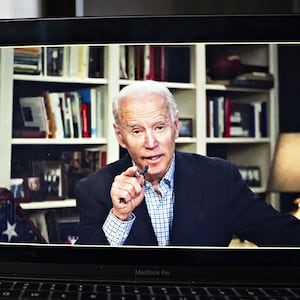As the end of convention season brings with it the final stretch of a years-long presidential campaign, a hauntingly familiar feeling is in the air in Minnesota, slowly alarming Democrats as November approaches—the chill of 2016.
Four years ago, Minnesota was supposed to be a breezy, no-drama pickup for Hillary Clinton. Neither the Clinton nor Trump campaigns bothered investing any significant resources there, and certainly not much in-person time—Trump flew in for a last-minute rally days before Election Day; Clinton never set foot in the state as the Democratic nominee.
Clinton won Minnesota’s 10 electoral votes by a mere 1.5 percent, or some 44,000 votes out of 2,944,813 cast. As Democrats were giddily investing precious resources to “expand the map” and compete in historically conservative states like Arizona and Texas, they nearly lost the state with history’s longest streak of voting for a Democratic presidential candidate.
Part of what made Minnesota such a nail-biter was an unexpected surge of Trump votes from the state’s rural areas, among people who were not reliable GOP voters or not reliable voters to begin with.
This shift, similar to what happened in other states—neighboring Wisconsin most excruciatingly—has not gone unnoticed by President Donald Trump’s re-election campaign. Over the course of the 2020 presidential cycle, Trump has visited Minnesota several times—Vice President Mike Pence visited Duluth just this weekend—and his campaign has reserved over $14 million in TV ads through November so far. Former Vice President Joe Biden’s campaign, meanwhile, has reserved roughly a quarter of that. A marquee ad from Biden meant to rebut Trump’s convention speech on Thursday is running in a slate of key swing states. Minnesota wasn’t one of them, though Biden is planning to hit the state, for the first time as a 2020 candidate, in an in-person campaign swing that Biden himself teased last week.
Now, among Democrats in Minnesota the concerned chatter is growing that Biden, like Clinton, might overlook the state as he focuses on recapturing ones Trump won in 2016, from Wisconsin and Michigan to more “reach” states like Arizona and Georgia. Of course, there are clear signs of Biden’s strengths in Minnesota; most recent polls have shown Biden ahead anywhere from 3 to 10 points. Still, a scenario where Biden wins Wisconsin’s 10 electoral votes after heavy investment from the party—but loses Minnesota’s 10—has crossed the minds of more than a few Democrats here.
“There’s so much optimism bias in planning that only positive trends will happen,” sighed a Democratic operative in Minnesota, who requested anonymity to discuss the presidential race candidly.
“We’ve looked at some people who voted in 2016, but didn’t vote in 2018, and we have Biden underwater by double digits with those people,” explained the operative. The same big-picture demographic trends that put Wisconsin in play for Trump—and that make the state worth fighting out and investing in for Biden—are undoubtedly at work in Minnesota too, they argued.
“We know marginal effects are strongest when one side is spending a lot, and that’s the kind of dynamic we’re looking at in Minnesota, where Trump is set to outspend Biden by a substantial sum of money,” said the operative. “There are definitely warning signs in here. It’s not a ‘for sure’ win without involvement—this isn’t a gimme.”
“The president is going to be competitive in Minnesota. He’s spending enough to make sure of it,” said another longtime Minnesota Democratic operative, who said the state could provide a chance for Trump to break a venerable Democratic coalition as he did in Wisconsin and Michigan four years ago. “Biden has some work to do with the young progressive voters in the cities to make sure they turn out… it’s not clear that the campaign understands that they still need to convince them to show up and cast a vote against President Trump.”
Democrats in Minnesota aren’t the only ones trying to keep down rising anxiety that, despite unemployment rates skyrocketing in response to a pandemic that’s on track to claim as many as a quarter-million American lives by Election Day, Trump might actually pull it off.
In Nevada and New Hampshire, another pair of states Clinton narrowly won in 2016, Biden is considered the favorite. In New Hampshire, the average of his lead in polls is nearly 10 points. For Trump, adding a state he didn’t win last time to his column this year is sure to be an uphill battle.
But 2020 may present new challenges for Democrats, giving pause to Biden backers in three states he absolutely must win.
“We’re just not as organized in 2020 as we were in 2016—that’s just a fact,” an official with the influential Culinary Workers Union in Nevada told The Daily Beast, citing the devastation that the pandemic and economic shutdowns have had on union members. Four out of five Local 226 workers are still out of work due to coronavirus-related shutdowns, which the official said has hampered everything from raising funds for get-out-the-vote efforts to providing food assistance for members.
Nevada is another state that Democrats appear to be banking on, despite Clinton’s comparatively narrow margin of victory—a mere 2.4 percent, a 4-point drop from President Barack Obama’s margin of victory in 2012—and the pandemic’s impact on the state’s most powerful political organizer.
The realities of the pandemic, which has halted in-person political outreach nationwide at the same time as it has affected the health and livelihoods of the workers that unions represent, has also hampered the ability of the state’s powerful labor unions to boost civic engagement among a loyal Democratic constituency.
“We actually have members that we have to serve and we have to get contracts with them and so that’s the priority,” said one SEUI official. “Obviously, normally we would do an extensive field program and be knocking on doors, we would be doing rallies, but with COVID-19 that’s not going to happen.”
But other union officials cautioned that while the pandemic has thrown the old political organizing rulebook out the window, Nevada Democrats can still expect organized labor to help.
“This is a global pandemic. Everyone around the world has been deeply impacted, but Culinary Union members are resilient,” said Bethany Khan, the Culinary Union’s director of communications and digital strategy, who pointed to a COVID-19 safety bill passed with the union’s support as proof that labor is still a force to be reckoned with in the state. “The Culinary Union is 85 years old and we are the best positioned to continue the fight to protect Nevada workers.”
In New Hampshire, the ghosts of 2016 aren’t quite haunting Democrats in the same way as out West, but they also haven’t been forgotten.
Biden finds himself facing a similar test in the Granite State, a state with few electoral votes but one that Trump has shown an eagerness to bring back into the red this election cycle. While county Democratic chairs were quick to sound at least cautiously optimistic about Biden holding the state, that hasn’t stopped one county party leader in an area Trump won by 586 votes in 2016 from making it clear that she wants to see added effort from the Biden campaign.
“I think they need to do more,” said Judith Kaufman, the chair of the Sullivan County Democratic Committee. “I think they need more visibility.”
Trump lost New Hampshire to former Secretary of State Clinton in 2016 by around 2,700 votes, and held two major rallies in Manchester as the state’s 2020 Democratic primary played out.
That narrow margin however, has not helped make Trump’s path in the state appear much easier. A late July poll by the Granite State Panel via the University of New Hampshire Survey Center found Biden with a 13-point lead on Trump.
And after abandoning a planned rally in Portsmouth last month, an in-person rally was held in the state on Friday. That same day, absentee ballot mailers that had been sent earlier by the state GOP led to a cease and desist order from the New Hampshire Department of Justice because they “may cause voter confusion and frustration,” in the lead-up to the state’s September primary, according to New Hampshire Public Radio.
New Hampshire GOP chairman Stephen Stepanek emphasized that Republicans are a united front in the state unlike in 2016. Trump suffered a major blow when then Sen. Kelly Ayotte (R-NH), who was running for re-election at the time, announced following Trump’s infamous Access Hollywood tape that she wouldn’t be voting for the GOP nominee. Ayotte would go on to lose her seat to Democrat Maggie Hassan the next month.
"The president is competitive, will be competitive and will win," Stepanek said.
But a Republican strategist in the state who worked for a different primary candidate in 2016 had less optimism for Trump’s chances in the state, calling the president an underdog at the moment.
“Smart Democrats that I know are running like their hair's on fire,” the strategist said. “They're not taking this for granted.”
Following his 2016 loss in New Hampshire it appears that Trump has had the state in mind as one he can flip, the strategist said, and the campaign's activity in the state reflects that.
“My perspective is that Trump's ground game here is strong, and even though he is unpopular here and even though his numbers are weak, Biden is a frontrunner who could cough up that lead at any time,” they said.
Biden campaigned sporadically in the state ahead of its February primary, but fled New England to campaign in South Carolina on the night of the state’s primary. As he rallied with the southern voters that would come to resurrect his campaign, the former Vice President came in fifth in New Hampshire with around 8.5 percent of the vote.
Despite failing to be a significant force in the primary, Democrats in New Hampshire don’t anticipate Biden’s poor performance in February hurting his odds in November. But there is a sense that Biden is benefiting from an anti-Trump fervor that has further strengthened his chances.
“There's both. There's people who are very enthusiastic for Biden and Harris and there's people who are just like, ‘We can't stand four more years of this other guy,’” said Carl DeMatteo, the head of the Cheshire County Democratic Committee.
And from his view in Rockingham County, where Trump won in 2016 by more than 10,000 votes, the county’s Democratic party chairman, Larry Drake, said the specter of the president has been even more of a driving factor.
“There are certainly Biden supporters, and I think he's well-liked and everything, but I think the main thing is the opposition to Trump," Drake said. “...I think that's the strongest motivating thing for people to vote for Biden.”









